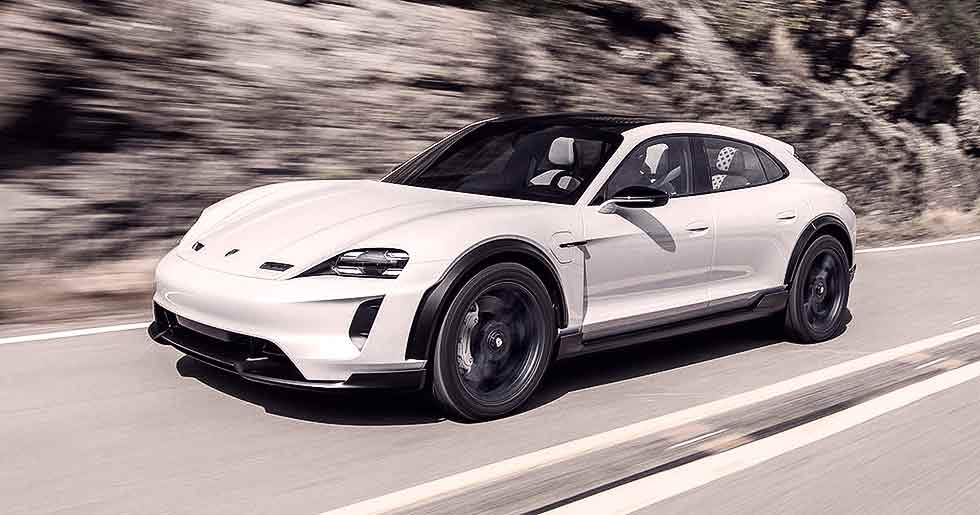Taycan Charge 440kW+ Porsche drops details on incoming Tesla hunter. Porsche’s incoming Taycan will be an all-electric four-door boasting in excess of 440kW and a 0-100km/h time “well under 3.5 seconds”.
The German automaker has outlined the initial specs of its Taycan sports car as it braces for what will be its first all-electric model. Details are few, but information from our European correspondent, Georg Kacher, who has driven both the Mission E and Cross Turismo prototypes, fills in a lot of gaps. Porsche has confirmed the top-spec Taycan will feature two “permanently excited electric motors”, one on each axle. Porsche’s acronym for the motors is PSM, which may get confusing as that’s currently its acronym for stability control. Nonetheless, the power is sufficient to propel the Taycan to 200km/h in “under 12 seconds”.

It’s here that engineering and marketing clash as according to Kacher’s Porsche sources, the flagship Taycan will be badged Turbo, an unusual name for a car that not only lacks a turbocharger, but any form of combustion engine. Presumably, the move is aimed at easing high-end customers accustomed to purchasing a 911/Cayenne/Panamera Turbo into electric ownership. It will sit above the Carrera and Carrera S.
The entry-level Taycan Carrera is expected to be rear-drive. Two specs of rear-drive PSM will be available – 240kW/320Nm and 320kW/550Nm – while the front wheels are powered by an independent PSM developing 160kW/300Nm, though 440Nm is said to be available in short bursts. Modelspecific outputs have not yet been confirmed, but we’d speculate the base Carrera will use the rear performance motor, the Carrera S the standard rear motor assisted by the front, and the Turbo both motors at outputs potentially as high as 480kW/850Nm.
The 800-volt battery pack delivers a range of around 500km and Porsche claims that 400km of that can be recouped in 15 minutes when connected to an 800V charger. Such chargers are currently few and far between, but as part of a six billion euro investment in electrification between now and 2022, in a rare example of co-operation, Porsche has formed a joint venture, dubbed ‘Ionity’, with rivals BMW, Daimler, Ford and its fellow VAG stablemate Audi to construct 400 fast-charging stations across Europe by 2020.
Speaking of Audi, its electrification strategy is closely aligned with Porsche’s. An all-electric supercar dubbed the PB18 e-tron (teased in the below right image) will be revealed at Laguna Seca on August 23, but our information is that it’s unlikely to make production in the short-term. Instead, Audi will build its own version of the Taycan based on the Porsche underpinnings, dubbed the J1 platform. Due late 2019, Audi’s version should be identical mechanically as the engineering concept has been frozen, however, with Audi-specific styling inside and out.
Porsche is reportedly also responsible for the Volkswagen Group’s SAZ platform, which stands for ‘sports car architecture of the future’. Capable of supporting internal combustion, plug-in hybrid and pure-electric drivetrains, it is expected to underpin the majority of the Volkswagen Group’s next-generation sports cars, including the future Audi TT and Porsche Boxster/Cayman. Its arrival date is still unclear, but isn’t expected before 2025. – SN/GK
ABOVE Taycan designed to transport four in speed and comfort, but not silence, as an audio generator is said to mimic a switchable exhaust.
SUPERCARS, BATTERIES INCLUDED
2012 Mercedes-AMG SLS Electric Drive
An early foray into all-electric supercars, but less than 100 were sold. Produced 552kW/1000Nm but range was limited to a maximum of 250km.
2016 Nio EP9
As quick as a GT2 RS around the Nurburgring (it’s the EV record holder, albeit using slicks) thanks to 1000kW of electric power. Just 16 to be built.
2017 Vanda Dendrobium
Singaporean supercar lent credence by the involvement of Williams Advanced Engineering. Production not yet confirmed, but it works.
2017 Jaguar E-Type Zero
Arguably more controversial than any supercar is the trend of converting revered classics to electric drive, typified by Jag’s EV E-Type.
2020 Rimac C_Two
The figures (1408kW, 0-100km/h 1.97sec, 0-300km/h 11.8sec) are science fiction, but Rimac has proven the tech and has 150 orders.





